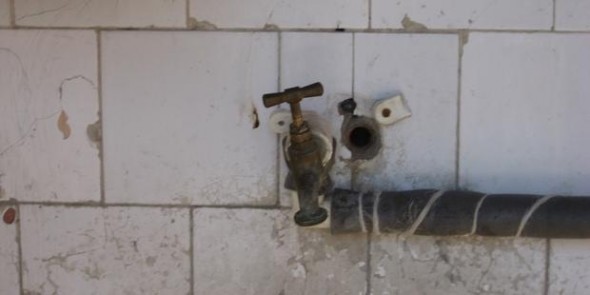July 19, 2012

After their forced eviction in Belgrade, the Roma families lacked running water for nearly three months. Photo: Amnesty International
Action by Amnesty International has prompted the authorities in the Serbian city of Nis to supply drinking water to Roma families who were forcibly evicted from their homes in the capital Belgrade nearly three months ago.
Since their forced eviction from the informal Belvil settlement on 26 April, five families – 18 people in all, including children and a baby born shortly after their arrival – have been living in an abandoned warehouse in the southern Serbian city of Nis, with no access to running water, sanitation or electricity.
Amnesty International has worked along with other NGOs in Serbia to ensure the authorities guarantee the families the right to water, following a visit to the warehouse by a delegation from the organization in June – when temperatures were beginning to soar above 35 degrees Celsius, making living conditions deteriorate even further.
On Wednesday, the office of the newly elected major of Nis informed the organization that running water had finally been hooked up at the warehouse.
“Having continuous access to clean drinking water is a small but welcome step towards guaranteeing these families their rights,” said Jezerca Tigani, Europe and Central Asia Deputy Programme Director at Amnesty International.
“It’s unconscionable that city authorities waited nearly three months to turn on the water supply when the temperatures have been so high.”
Amnesty International will continue to press the Nis city authorities to provide adequate alternative housing for the relocated Roma families, and to improve their living conditions in the meantime, including by providing electricity.
“We understand that local authorities which received the evicted families had to provide emergency accommodation for these families with only a few days notice” said Jezerca Tigani.
“They must now ensure that they are promptly relocated to adequate alternative housing that meets human rights standards.”
The Roma who were relocated to the warehouse on Daniciceva Street in Nis are among more than 240 families forcibly evicted from Belgrade’s Belvil settlement on 26 April. More than 100 of the families, who were not registered as Belgrade residents were bussed out of the capital and taken to towns and cities across the country.
At the time of the forced eviction – which Amnesty International said “flagrantly violated international law” – a pregnant 17-year-old girl due to be sent to Nis told the organization that she had no home and nowhere to stay in the southern city. She and her baby are now amongst the families living in the warehouse.
When the families were brought to the warehouse in Nis, although there was no running water, infrastructure was already in place to bring water into the building.
Two months later, when Amnesty International visited Nis, city authorities ensured them that the water supply would be hooked up in a matter of days. But apart from a brief visit to the site by water company workers, no further action was taken until this week, after a new city mayor came into office.
In the meantime, the families have been forced to use plastic containers to fetch water from inside a public market 115 metres away. Access to water there has been restricted according to the market’s opening hours – 7am to 3pm – and the whims of a market official who frequently denied access to the Roma families.
The nearest alternative public water source was more than a 30-minute walk away in the city centre.
The right to water requires that water be available in – or in the immediate vicinity of – where people live. According to the World Health Organization, people face health risks when their water source is more than 100 metres away from their household, or if it takes them more than five minutes to collect water.
Source: Amnesty International

Leave a Reply